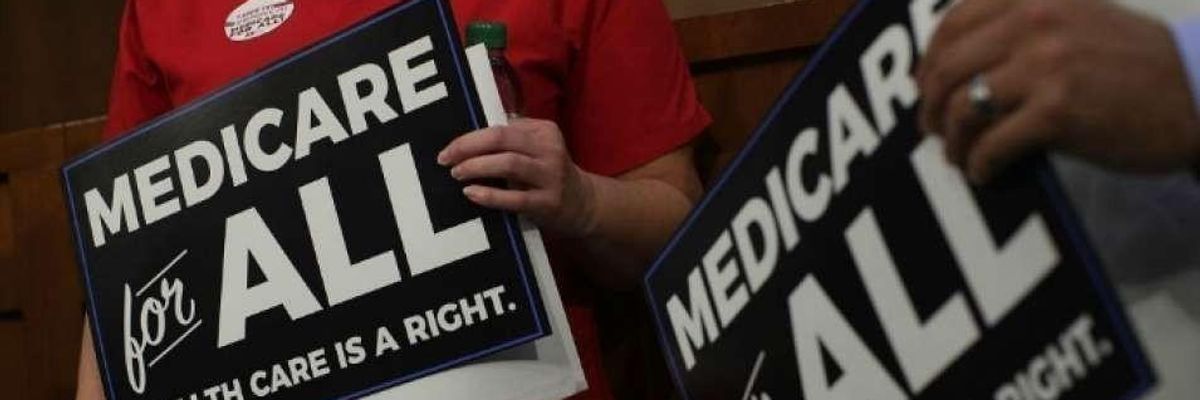Choice. It's what we all want in America, right? We rail against being told how to run our lives, especially by the government. But when it comes to health insurance, choice is an illusion--you don't really know what you're getting.
American choice in healthcare is a "P.R. concoction" that obscures the lack of real choice--of doctors and hospitals.
Now, with the COVID-19 pandemic straining our healthcare system beyond its capacity, this mirage of choice is coming back to bite us. Many Americans with COVID-19 won't get their testing and treatment covered because the plan they chose doesn't fully cover this kind of care.
If you are fortunate enough to be insured by one of the few companies that promises to cover COVID-19 treatment (Aetna, Cigna, and Humana), you chose well, or perhaps you just got lucky. But even many insured patients will receive bills for out-of-network services and will be ineligible to have these fees waived. Many will be unable to demonstrate special COVID-19 insurance provisions because they can't procure tests or have false negative results (estimated from 1 in 10 to 1 in 3 of truly infected) and thus will not qualify.
The empty White House promises of paying for COVID-19 services gloss over the messy and painful reality. While $100 billion designated for doctors and hospitals to provide care for patients with COVID-19 includes treating the uninsured, it is unclear how to disentangle who and what is covered and which conditions can be attributed to the virus. It's crazy: you may get help for medical costs, but only if you can prove that COVID-19 caused your illness. No other wealthy country does this; they have universal standard medical coverage.
To make matters worse, many of the 6.6 million newly jobless who filed unemployment claims near the end of March will now join the ranks of the uninsured and under-insured whose COVID-19 treatment will not be covered. All of these problems are exacerbated in states that opted out of Medicaid expansion under Obamacare. To add insult to injury, an outsized chunk of the $100 billion will go to hospital administration instead of critically needed care and resources. Insurers stand to realize a big profit from the pandemic due to indefinite cancellation of non-urgent procedures, a high prevalence of deaths among patients with costly co-morbidities, and a projected increase in premiums next year.
How did we get here? As Wendell Potter (a former public relations executive in the health insurance industry) explained in a New York Times op-ed in January, American choice in healthcare is a "P.R. concoction" that obscures the lack of real choice--of doctors and hospitals. This choice is an unpleasant ill-informed selection among highly restrictive plans. Not to mention having few options, and loss of coverage due to changes made by employers or job loss. Industry lobbying and advertising have so successfully promulgated the myth that Americans have choice it was advanced even by many Democratic presidential candidates.
The insidious root of the problem is that healthcare as a market commodity simply does not work, and we've known this for decades. Pioneering economist Kenneth Arrow's groundbreaking 1963 article clearly established that medical resources can't be efficiently allocated by the usual free market processes. There is too much uncertainty about disease incidence and treatment efficacy. Further, patients are terrible healthcare "consumers" or shoppers. They lack the knowledge to make such selections. Patients forego care when facing financial barriers, without distinguishing properly between necessary and optional care. Even when provided tools for comparison-shopping, patients can't use them effectively.
Our decades-long experiment in market-based healthcare has failed miserably, yielding worse health outcomes and up to twice the costs of other countries.
Because healthcare isn't a viable market commodity, the efficiencies realized in properly functioning markets (like cars, phones, and agricultural products) are unobtainable. Our decades-long experiment in market-based healthcare has failed miserably, yielding worse health outcomes and up to twice the costs of other countries.
With the COVID-19 pandemic reaching epic proportions, the problem of "choice" is seen in stark relief. Our response to the epidemic is unethical and harmful to health, just like our health system is during normal times. Fundamentally, "choice" of health insurance creates a dizzyingly complex and inefficient morass that reaps profits for insurance executives and shareholders--while creating huge financial barriers to care.
The solution is straightforward: universal single-payer health insurance, or Medicare for All, would cover everyone with the same high-quality care, progressively financed. You choose your doctor, what you need is paid with no or minimal co-payments, paperwork is greatly streamlined and simplified, and we save enormous sums of money in the process. Especially now with the extreme shortages and exploding needs of COVID-19, we need Medicare-for-All so that everyone has access to testing and treatment regardless of economic status.




